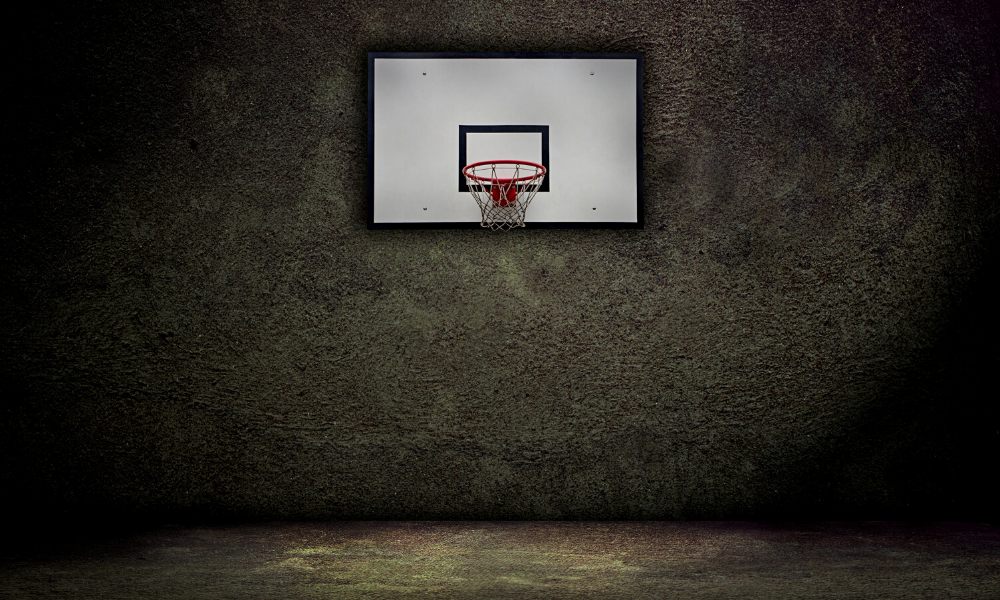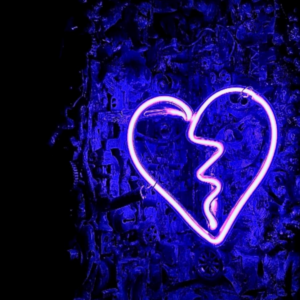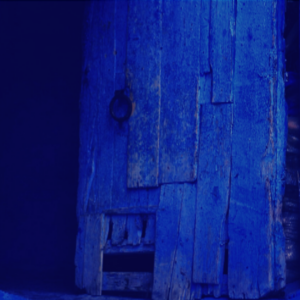Content Warning: Themes of suicide.
We’d rather wait for a game of four-on-four to end than play there. And gathered around the perimeter and sitting crossed-legged on the grass, we’d watch bodies bounce with the ball up and down the court for however long to a game of twenty-one. A rule passed from some kid to another, but we knew never to play on that hoop that perched closest to the woods. It loomed as one does—a shadow, stretching from out-of-bounds to the foul line like a giant scythe. But it never deterred the games. Subtracting a half of court, at least three games could run—triple-halves or one full and one half.
Typically though, it was The Triples, and that’s what we called them before gathering and then departing from home on our bikes. There were some kids on pegs and some peddling, a quarter-mile through fetterbush, hollies, and oaks—over one rickety four-by-four to cross an overpass of water, and walk the rest along a two-housed property line where the kid that no one talked to lived. We imagined he peeked out the window, watching us like Boo Radley—his face slightly smudged against the glass breathing slow and heavy and desiring. So, tight-lipped, we passed—with bikes in hand and a ball stuffed in our shirts: the One Woman Bosom, the Pregnant Baller, or just the Octa-Mom for the kid who could carry the most balls.
And when we got there, you could hear the clank of an off-put shoot; you could hear feet and legs in a constant shuffle; you could hear a kid yelling—I got next; you could hear twelve-year-olds speaking a language you might not understand—how pass the rock meant send an assist, how being on fire meant consecutively scoring, how that’s butter was a perfect swish. But you’d also see that no one played on that lone court—that no matter how many kids stood on stand-by, they wouldn’t even step on the asphalt—that rumor was you’d instantly break thumbs and sprain ankles—and about the one kid who came down so hard after a rebound he tore both ACLs, and the other kid who lost two fingers in the net—how his blood sprayed red and the red-painted rim that mouthed the metal-chinked net kept those fingers, how sometimes if you looked long enough, you’d see the outline of a body still hanging.
The superstition was strong; and when the night came, how it comes in the Pines—quick, sudden, like a boundless cloud creeping and taking hold of the sky—and how the trees closed, like a mouth, huge and earthy, and consuming what was left of the sun, we mounted our bikes, without verbal cue—watching the light quickly fade, and those basketball hoops stood eclipsing like sundials. With no LEDs above the court, we scurried, for fear of the dark was a real thing—that the woods reached and grabbed—how the darkness was malleable, how it was as black as that asphalt. So we didn’t travel those trails back home; we took the main road.
This was also where the shift changed; the big kids arriving while we left—coming sound first: the bass and treble of their cars booming—their engines reviving, trying to scare us off. We shared the hoops through fear as well as by the hour. And when their cars parked, they used high beams to spotlight the courts. That’s where they say they found him—at some shift-change—that he didn’t want the children to see; that whatever day after we left and before the teenagers arrived, he strung a rope around his neck, attached it to a rim, and dropped and kicked and the whole hoop shifted a little and then stopped.
* * *
The kid from school whose house bordered the courts and whose dad hanged himself from that basketball hoop never talked much; but he was large and would have been an athlete, though he never played. No one ever said anything to him. We were all scared of this giant, as much as what happened to him—that this horror followed him, this death hanging to his body: how he slumped in the cafeteria and classrooms, how slow and sad he walked in those hallways, how he was just like a monster. And it stunk, the death and the kid, a wet dog stench that didn’t wash out; it nestled in him—in his hair, his skin, his clothes, and bones—and it never let go.




